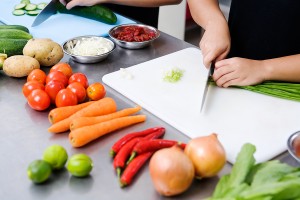Vegetarians listen up.
As promised here is a topic I come across quite often but I am not an expert on – is a vegetarian diet actually healthy? I have enlisted the help of nutrition expert Karen Taylor to give you the details you need to know.
Karen, I have had quite a few clients who have been vegetarian. Could you please explain what exactly the vegetarian diet involves?
A vegetarian diet is a plant-based diet which limits foods from the animal kingdom. There are several categories of vegetarians, as outlined below:
Semi-vegetarian – Dairy foods, eggs, chicken and fish, but no other animal flesh
Pesco-vegetarian – Dairy foods, eggs and fish, but no other animal flesh
Lacto-ovo-vegetarian – Dairy foods and eggs but no animal flesh
Lacto-vegetarian – Dairy foods but no animal flesh or eggs
Ovo-vegetarian – Eggs, but no dairy foods or animal flesh
Vegan – No eggs, dairy, fish or meat
The biggest challenge I have with my vegetarian clients is their protein intake. How can vegetarians get the necessary protein?
It is certainly more difficult for vegetarians to optimise their protein intake. This is a problem for all vegetarians but even more so for those looking to speed up their metabolism, lose weight and get the most out of their training regimes. Along with protein deficiency, deficiencies in key nutrients including vitamin B12, iron and several other vitamins and minerals are common for vegetarians.
The good news is that vegetarians can get the necessary protein in their diet by combining plant protein sources.
Combining Plant Protein Sources
Animal sources of protein contain all eight essential amino acids which means they are a “complete” protein. Plant sources of protein, on the other hand, generally don’t contain all eight essential amino acids, thus they are termed “incomplete” protein sources. For optimal protein intake, a vegetarian must “combine” their protein sources to ensure they are getting adequate “complete” proteins each day.
The following combinations will provide a complete protein.
• Grains with legumes
• Grains with eggs or dairy
• Legumes with nuts and seeds
• Legumes with eggs and dairy
• Nuts and seeds with grains
• Nuts and seeds with eggs or dairy
Following are some examples of these foods.
Item & Healthy Sources
Legumes – Lentils, all types of beans, peas, chickpeas, sprouts, peanuts
Grains – Wheat, rice, corn, rye, oats, barley, buckwheat, spelt, quinoa (all available as a whole grain, flour, bread, pasta or noodles)
Nuts – Almonds, cashews, walnuts, brazil nuts, pecans, pistachios, hazelnuts, macadamias
Seeds – Sesame seeds, sunflower seeds, pumpkin seeds (pepitas), linseeds
When clients don’t eat any red meat, chicken, seafood or even eggs, I find it challenging to give them nutrition advice. Their simple carbohydrate is usually through the roof and their body fat quite high. What type of healthy and nutritious meals would you suggest?
Following are some meals which are quick and easy and provide a complete protein in the one meal.
• Brown rice with lentil dahl
• Wholemeal toast with a poached egg
• Stir fry tofu with sesame seeds and cashews
• Chickpea curry with yoghurt
• Almond spread on spelt bread
• Seed/nut mix sprinkled onto fruit and yoghurt
Processed foods, especially simple carbohydrates, can be quite addictive (ever tried to stop eating those chips or lollies once the bag’s open?). This leads to excess calorie consumption and ultimately an increase in your fat stores.
Alternatively, one of the golden rules of healthy eating is to avoid processed foods. Unprocessed foods tend to have more fibre for satisfaction, and if you add some protein, this will contribute further to satiety and reduce those cravings. In this way, you will keep your metabolism firing and be able to achieve and maintain your goal weight.
Do you believe a vegetarian diet is healthy?
I believe that a vegetarian diet has the potential to be one of the healthiest diets on the planet. Unfortunately, the majority of vegetarians get it wrong and the lack of protein and nutrient deficiencies from their diets result in fatigue, low muscle mass and excess body fat.
For a vegetarian to be healthy, they need to invest their time into ensuring that they are getting the nutrients they need. The importance of protein combining cannot be overstated. It involves some work and preparation but the hard work will be more than worth it when you are firing on all cylinders and burning fat like a champion!
Karen Taylor is a nutritionist and naturopathic herbalist and is the owner of Taylor-Made Nutrition, a busy nutritional consultancy providing advice on diet, health issues and methods to achieve optimal health.
If you think this article could benefit someone else share the love by sharing this article using the buttons below 🙂
